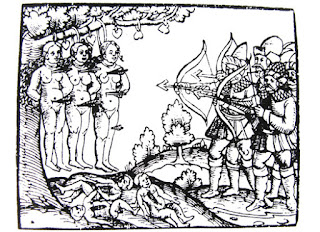Hello again gentle reader. The city I live in has had an interesting history and this history is something my blog has mostly avoided. I now intend to put that right with my own potted Riga history.
 |
| Early map of Riga |
The Founding of Riga
The River Daugava has been a major trade route going all the way back to the time of the Vikings. About 15km upstream traders found a sheltered harbour and a settlement called Duma Urbs was built around the 2nd century. This settlement was settled by the Livs, who were an ancient Finnish tribe. |
| Persecution of Livonians |
Riga itself started to develop as a centre of Viking trade in the early middle ages and the settlements inhabitants were mainly fishermen, livestock farmers and traders.
A monk, Meinhard arrived with the German traders with the aim of converting the Livonian pagans to Christianity. He failed and died in Ikskile in 1196.
Two years later, Bishop Berthold arrived to complete Meinhard's mission. This time however a group of Crusaders came with the priest and conversions were done by force.
Berthold was killed soon afterwards and his forces defeated by the Livonians. The Church mobilised to get their revenge. The Pope, Innocent III, issued a decree that led to a Crusade against the Livonians.
 |
| Bishop Albert |
 |
| Innocent III |
Bishop Albert arrived in 1200 with 23 ships and 500 soldiers to quell the Pagans and sieze control for the church. This time he was successful and in 1201 he used force to move the Livonian Bishopdom to Riga while extorting money from the people of Riga for the priveledge.
#riga #livonians #bishopalbert
No comments:
Post a Comment